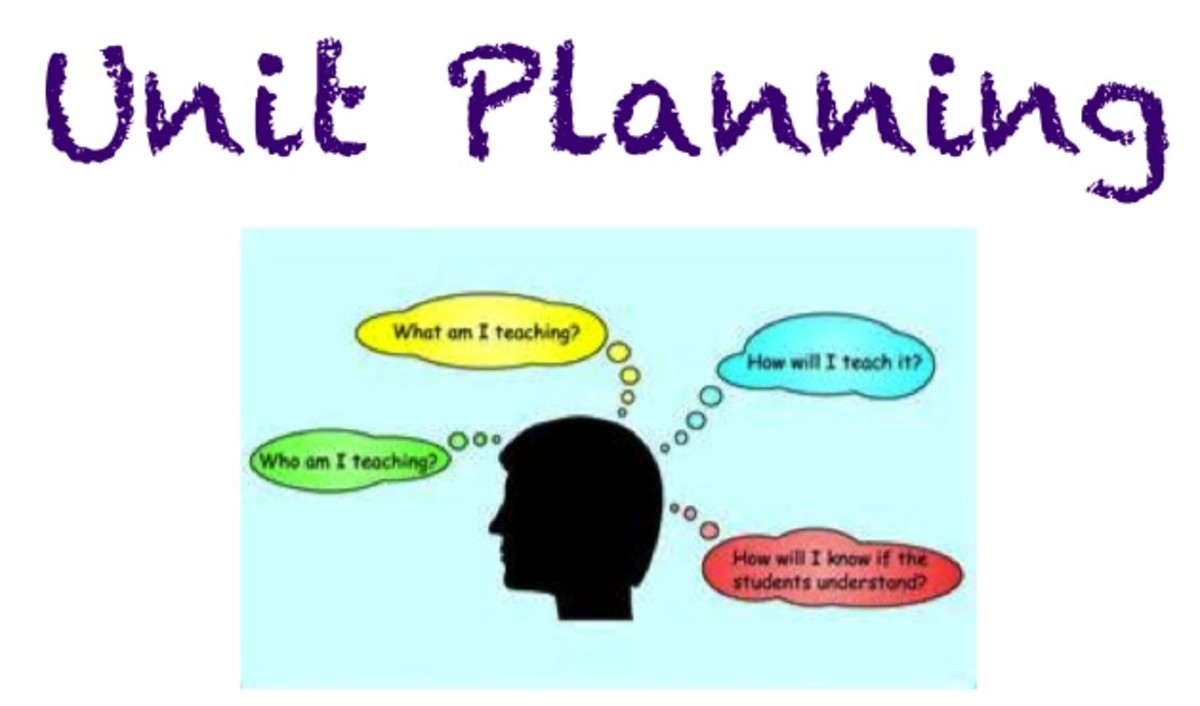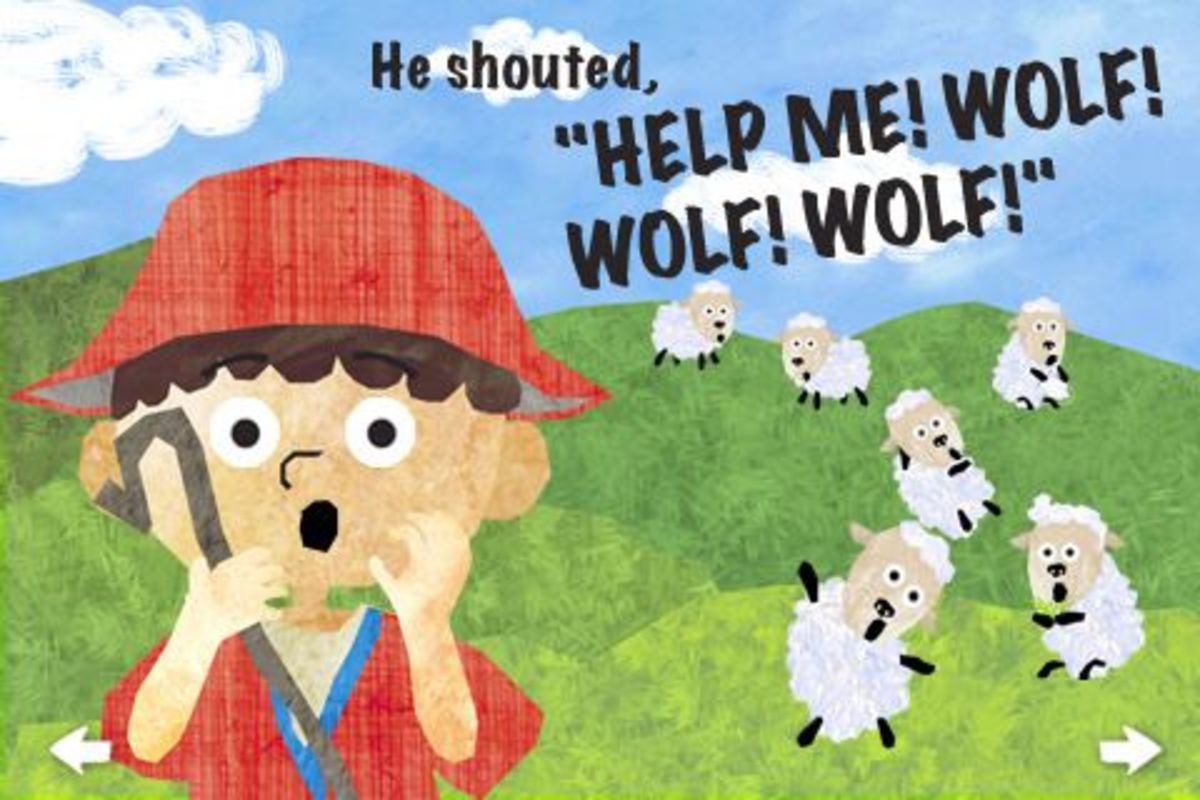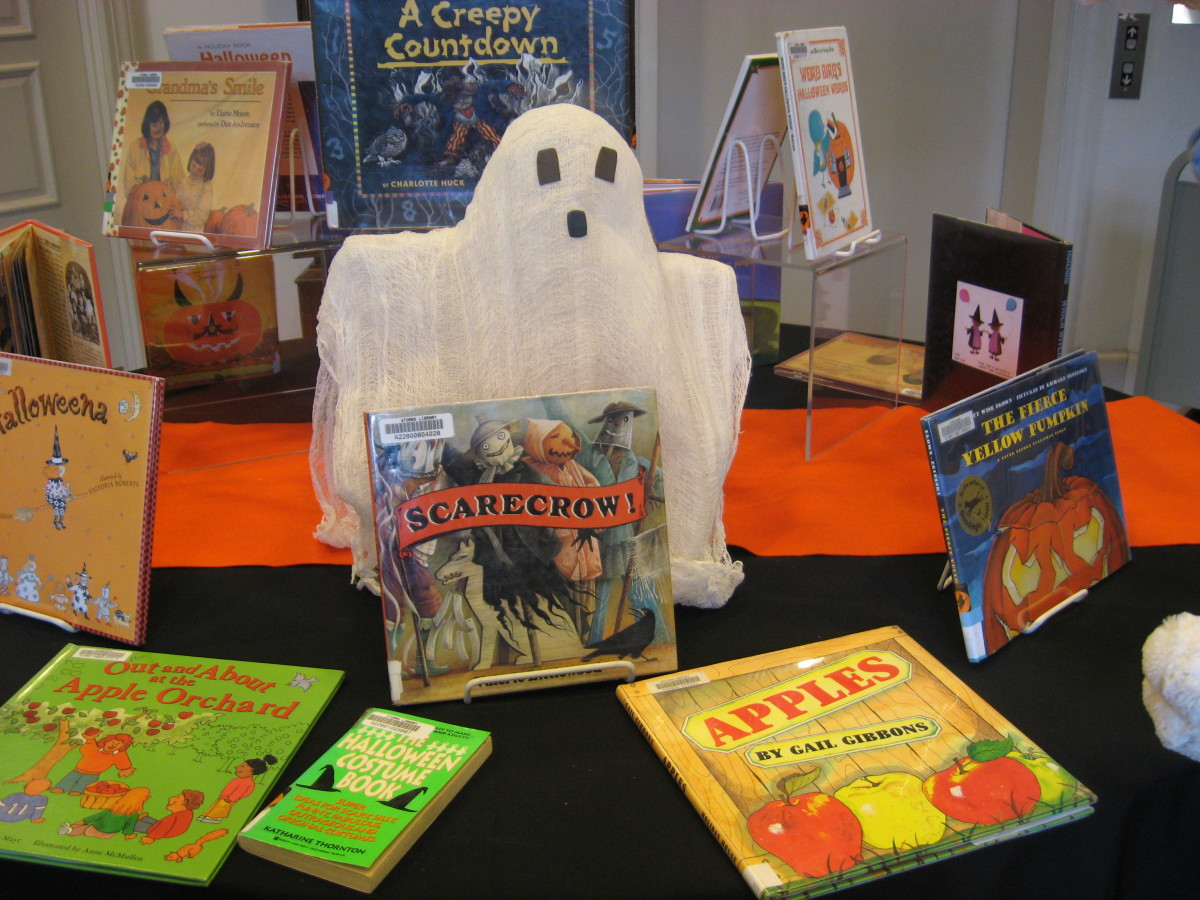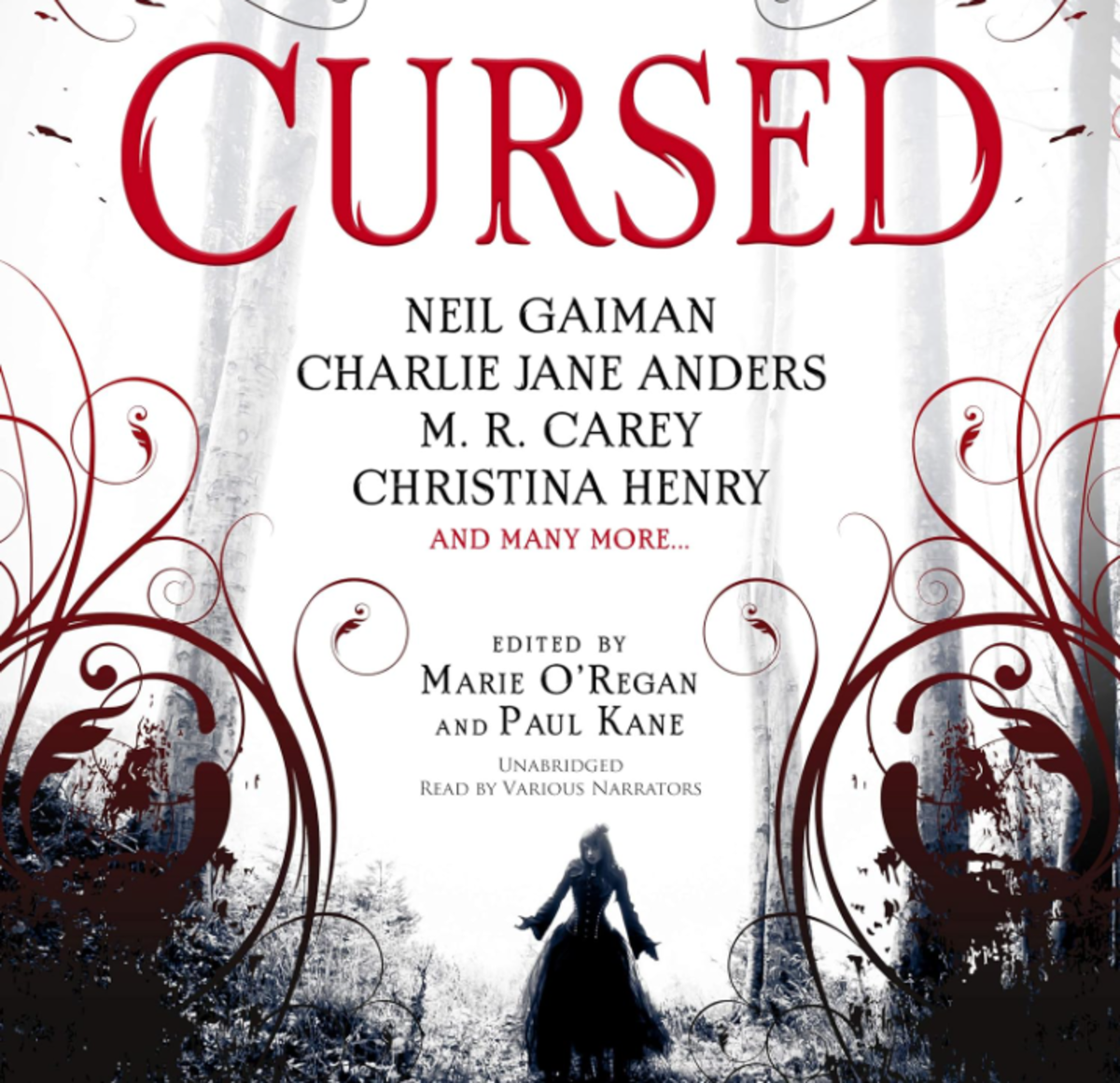Life Lessons From Sylvester and the Magic Pebble
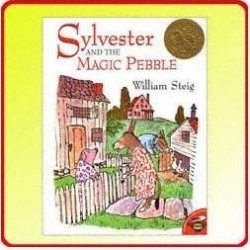
Magical... In More Ways Than One
I was subbing in a first grade class recently, and the teacher left a stack of books on her desk: I could pick one, or two (or three...) to read aloud as time allows. I hadn't read Sylvester and the Magic Pebble for a long time (Could it really have been since childhood?) but, oh my, now I will read it again and again. I will read it to kids!
You know how, when you read a book in childhood, there can be such a long journey from the beginning of the problem to the resolution -- but when you read it later, the journey isn't there? I mean, from a curriculum standpoint, there may be plot movement. For a six-year-old, there may still be a journey. But from an adult's emotional standpoint, there's none. Ah, but some books...
Here's the gist/ the story problem of this classic: Sylvester the donkey finds a magic pebble and then, when he's on his way home to show his mom and dad, he runs into a lion: Aaah! Well, oops -- he solves the initial problem by wishing he was a rock. That takes care of the lion, but now Sylvester is no longer touching the pebble, and he has no way of wishing himself to be anything but a rock.
How utterly sad! As Sylvester's parents grieve through the winter, and hopeless Sylvester wakes less often (because what's the point?) I'm getting broken up, I'm trying not to lose control of my voice. By the time Sylvester's grieving parents take themselves off to a spring picnic at the rock and set the pebble Sylvester would have loved atop... By the time those wishing people (or donkeys) make their magic... Well, let's say as I was reading the page with the color picture of the picnic things toppling off the back of a little donkey who is again a little donkey, my voice was teetering out of my control. (Drama on the lead up, huskiness on the emotional resolution... I've done it before. You can learn something about plot structure from when the teacher cries.)
A couple weeks after the first Sylvester incident, I went in to a K-1 classroom for the afternoon, and the teacher gestured to a box of books: Do a read-aloud if there's extra time. Soon after, I had located... Sylvester and the Magic Pebble. The class enjoyed it. I enjoyed it.
Hmm. I do spend a fair amount of time in K-2 classrooms, but I can't count on them all having a copy of the story. I think it's time for a copy of my own.
Now here are some lesson plans for Sylvester and the Magic Pebble (and ideas for other books that may be paired with it).
Image: Amazon
Tackling a Theme: Wishes
As I contemplated the story, I thought about other takes on wish granting. I couldn't help but think of the tale that appeared in my own reading anthology along about second grade. The couple in the story get into an argument. The husband wishes that there was a sausage hanging from his wife's nose, then has to wish it away again. That's rather a different take on wishes, and family, and perhaps human nature as well! In both instances, life goes on as before -- but who is it who has more gratitude and grace?
So how about comparing these and other tales of wish granting? I'm think of using a different color of tagboard (or different color large size sticky note) for different wish stories. Jot down a phrase each time a character makes a wish (ie "wished to be a rock"). Try sorting them in different ways: foolish vs smart wishes, important vs trivial (or unimportant) wishes, selfish vs unselfish wishes.
These charts can be used to compare and discuss:
What happens when characters make (insert type of wish) wishes? And might the author be trying to teach us something?
Are there any stories where characters make only foolish wishes (where they never learn)?
Which of these stories are happy? Why?
For Comparison: Fairy Tales With Wishes
- The Three Wishes: Sausage Style
The tale where the man wishes the sausage on the tip of his wife's nose. It's a little different here than what I remembered: a gentler retelling perhaps. - The Three Wishes: Pudding Style
In this version, it's a pudding that sticks to the husband's nose. They're a bit less kind to each other than in the above version. - The Fisherman and his Wife
A tale of greed.
What if Sylvester had made it home to share his pebble with his folks without running into the lion?
A Moral and Life Lesson
What does this tale have to offer in terms of hope? Turn back after the class has read, and more or less digested, the story. What was it Sylvester said when he determined that his problem was virtually unsolvable? He said that the only way he could get turned back would be if someone picked up the pebble and wished the rock was a donkey! But is that what happened? Not exactly! (And were there any other possible solutions that Sylvester didn't think of?)
Personal connections: maybe a difficult subject to broach, but some children will have them. Can any of the children remember a time when they were sure there was only one solution -- or none at all -- but were proved wrong? And what's the lesson in that? (Can they find a moral?)
A Caldecott Winner With Something to Say
Here it is: the 1970 Caldecott winner. The first two reviews on Amazon are thought provoking. One comments that children do experience sadness and that it can feel lonely for adults to paint the picture of an always happy world.
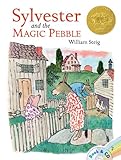
Celebrating Banned Book Week With Sylvester
A banned book -- or even a want-to-ban book? Say what?
At any rate, here we have an excerpt of a librarian/ storyteller turning the spotlight on Sylvester and the Magic Pebble for Banned Book Week.
A Surprising Ending
Sylvester and his folks get to keep the pebble. The book concludes by saying that they put it away in a safe, but for now they had everything they could wish for.
Wow, I've got a major wish fulfillment thing going on with this book. Everyone's reunited -- happy ending right there! -- and they still have that pebble just in case.
But the ending is also surprising, at least to an adult who has read so many storybooks. When has a storybook character ever been allowed to keep anything that powerful? Contemplating the implications may be beyond the capacity of children in the target age range. Still, they can talk about whether the ending surprised them.
Will Sylvester and his family ever use the magic pebble again?
A Theater Interpretation
- Enchanted Theater Company Study Guides
Theater companies are a rich source of teaching materials. Enchanted Theater Company is no exception. The William Steig classic is from the 2011 to 2012 season.
More Lesson Plans for Sylvester and the Magic Pebble
I've been browsing lessons. My criteria for this list is the following: I felt like a page had something to offer me. This usually means something that is longer than a blurb. In most cases, I go for lesson plans that are free. I may include something noteworthy that carries a price (and note it as such) but nothing that asks you to sign up for a membership.
- Technology Lesson Plan
This lesson invites kindergarten children to use a Paint program to draw their favorite part of the story. There are also some discussion questions included. - Second Grade Book Club
Lanai Road Elementary has a great set of discussion questions, from basic plot comprehension to critical thinking and analysis of the art. There's also a look at cause and effect. Just look for the title in the section "sample discussion materials". - Incorporating the Common Core/ Art
This lesson plan idea incorporates a 2nd grade reading standard and a 3rd grade math standard. - Second Grade Core
Here you can see how a second grade teacher incorporates Sylvester into a course of study based on the Common Core. - Thinking Questions
This article, from Teaching Children Philosophy, concludes with 33 thinking questions.
Using Sylvester and the Magic Pebble in 1st Grade
Sylvester and the Magic Pebble is beyond 1st grade reading level, but there's a lot that can be done with it, comprehension-wise, if it's used as a read aloud. It is an easy book to identify structure -- what the problem is, and how it gets solved. Sylvester turns himself into a rock. No doubt about it, that's a major problem. And the solution comes when he finally has the chance to turn himself back. A little donkey again!
- Common Core Standards for 1st Grade
I think the book works well for standards 1.1 to 1.3. Students could also identify phrases that create feelings (1.4). Paired with other stories, it could be used for 1.9.
Sylvester Does Kindergarten Social Studies
Here's a good deal at the kindergarten level: Sylvester, plus some other literature, including poetry. Since it's kindergarten, there's audio! This is actually part of a social studies curriculum. The theme is called My House.
William Steig Author Study Resources
Here are some of the better known books by William Stein. You can use them to study Stein's style as an author and illustrator -- and to make comparisons.
What is similar about Dr. De Soto and Sylvester and the Magic Pebble? They both have talking animals -- and a bad guy of some sort. What's different? The mood, for one thing. Dr. Soto could be considered lighter fare. It's not a personal favorite of mine because of the... well. gratuitous bad guy-ness,if that makes sense. I can get sadder over the bad guys than the sad guys -- if I read with attention and any degree of seriousness. But it's another story that captures children's attention. The story problem is identifiable. And yes, the good guy wins -- this time with a bit of chicanery.
What about Caleb & Kate? It also features someone who gets turned into something other than himself and can't communicate his plight. It also features family love, even though here the husband and wife are shown fighting. The husband, in dog form, is with his wife the whole time, though, alas, she doesn't know who he is. It takes an act of bravery to have that dog back in human form. (I checked this out from my school library more than once along about second grade.)
- William Steig Resources from Web English Teacher
Includes resources for Brave Irene, Sylvester, and Shrek, plus a link to the author's official web page. - Steig Author Study Created by Teachers
A 3rd grade author study created by a couple teachers. There are quite a few resources available if you click on items in the sidebar list.

![We the People Greet the World Level K PAK [Paperback] (Audiobook) Houghton Mifflin (What?)](https://m.media-amazon.com/images/I/51DmftolvgL._SL160_.jpg)




